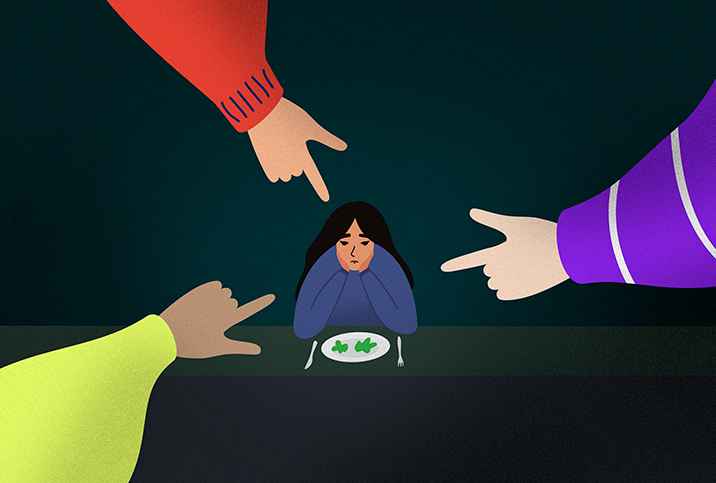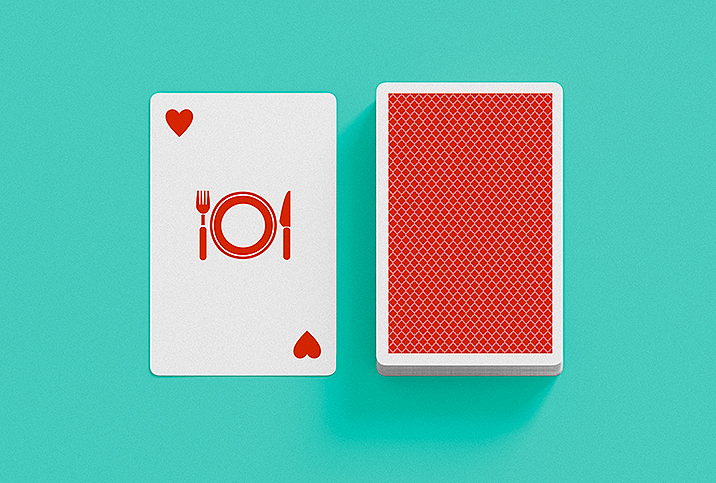A Harmful Fixation on Health: Orthorexia, Part I

From Instagram and TikTok to grocery store aisles and gyms, messages touting the paramountcy of wellness pervade modern life, and achieving and maintaining a state of well-being certainly is a wholesome, universal aspiration. But for people with the eating disorder orthorexia, healthy living becomes an obsession that can have severe, injurious consequences.
"Orthorexia nervosa is a term derived from the Greek 'ortho,' meaning right or correct, and 'orexia,' meaning appetite or desire; nervosa means obsession," said Rachel Evans, Ph.D., an eating disorder psychologist in Derbyshire, United Kingdom. "It is an obsession with eating correctly; typically restricting and avoiding food based on how clean or healthy food is judged by the individual to be."
Choices vs. rules
Sophie Smith, an eating disorder advocate in Perth, Australia, struggled with orthorexia for four-and-a-half years. She remembered her relationship with food and health initially became complicated in her early teens, when she first noticed her weight was increasing while her height remained stagnant—a normal part of puberty.
"I think I was mainly worried about a few things: that I would be unhealthy if I gained weight and reached a certain BMI; that consequently, people would judge me and think I'm a bad person or lazy or something; and that I would be unattractive," Smith explained. "These concerns definitely came from me having internalized fatphobic beliefs from our fatphobic society that universally sees being fat as a bad thing and autonomically meaning a person is unhealthy."
While there is no singular cause of eating disorders, including orthorexia, factors such as having a negative body image, low self-esteem, neurodivergent tendencies and a history of trauma may increase a person's vulnerability.
Evans has also recovered from orthorexia and bulimia. She explained that for many people with orthorexia, what starts as making healthy choices can turn into black-and-white thinking with strict rules regarding good and bad foods, and an overwhelming sense of guilt or shame when those rules are broken.
"These thoughts lead to behaviors such as scrutinizing food labels, avoiding food prepared by others, [such as] friends and family or at restaurants, unless the ingredients are known, and even avoiding social situations involving food for fear of eating the 'wrong' thing," Evans said.
Smith said she developed a laundry list of rules regarding food, exercise and related behaviors, and was consumed with fear and guilt about breaking them.
"It became an eating disorder when I felt so compelled by a voice in my head to engage in certain behaviors, such as exercise and not eating certain foods, that I felt powerless under the commands of this part of myself, even when I didn't want to engage in certain behaviors," she said. "It started interfering with my life."
The characteristics of orthorexia
"I think that people begin wanting to pursue health but end up at the point of starvation because there are so many conflicting views of what healthy eating actually is," Evans said. "It's easy to go on the internet and find a persuasive article about why processed food is bad, why low-carb diets are good, why you shouldn't eat fat or meat or even sweet corn. And people end up in this place where there is very little that feels safe to eat anymore."
Although orthorexia has gained recognition among experts and organizations such as the National Eating Disorders Association, it is not specifically listed in the Diagnostic and Statistical Manual of Mental Disorders, which outlines assessment criteria for psychiatric conditions.
Additionally, experts disagree about whether it is a standalone eating disorder or a form of anorexia nervosa or avoidant restrictive food intake disorder (ARFID). Some suggest it's the manifestation of an anxiety disorder, such as obsessive-compulsive disorder (OCD), especially as research indicates many people with orthorexia and anorexia also have anxiety or depressive disorders, or both.
"One difference between orthorexia and other eating disorders like anorexia or bulimia is that with orthorexia, people are very concerned with the quality of food, not just the quantity. They also may not be driven by the desire to lose weight or achieve thinness. Rather, their desire lies within wanting to be healthy," said Allison Chase, Ph.D., an eating disorder specialist and clinical psychologist with Eating Recovery Center in Austin, Texas. "The similarity between these eating disorders is they are all often centered on control and use food as a way to exert control. There are often other commonalities, like a history of anxiety or perfectionism. Additionally, they can all lead to medical issues like malnutrition, cardiac issues and electrolyte imbalances."
The issues around diagnosis
The absence of firm diagnostic criteria makes it difficult to discern how many people are affected by orthorexia. But a 2015 survey of psychiatrists, psychologists, nurses and social workers published in the journal Neuropsychiatric Disease and Treatment found two-thirds of respondents reported working with patients and clients who exhibited "clinically significant orthorexia" symptoms. Another study hypothesized that the disorder affects about 1 percent of the population.
In terms of diagnosis, Evans said orthorexia is placed under the umbrella of "other specified feeding and eating disorders (OSFED)," which represents about 32 percent to 53 percent of all eating disorder diagnoses. Since early 2020, diagnoses of many eating disorders, including anorexia, binge eating disorder, bulimia and OSFED have increased—a likely culmination of the pandemic's physical, psychological and social effects as well as society's intensified focus on health.
Lack of understanding about the disorder, and society's emphasis on healthy living, can make it challenging for people with orthorexia to recognize their problem and seek care.
"I think often people just don't understand how it could be a problem. The pursuit of health is seen as such a worthy and commendable thing in our society, so that makes it really hard for people with orthorexia to get across how damaging certain health behaviors can be when they're taken to an extreme," Smith said.


















